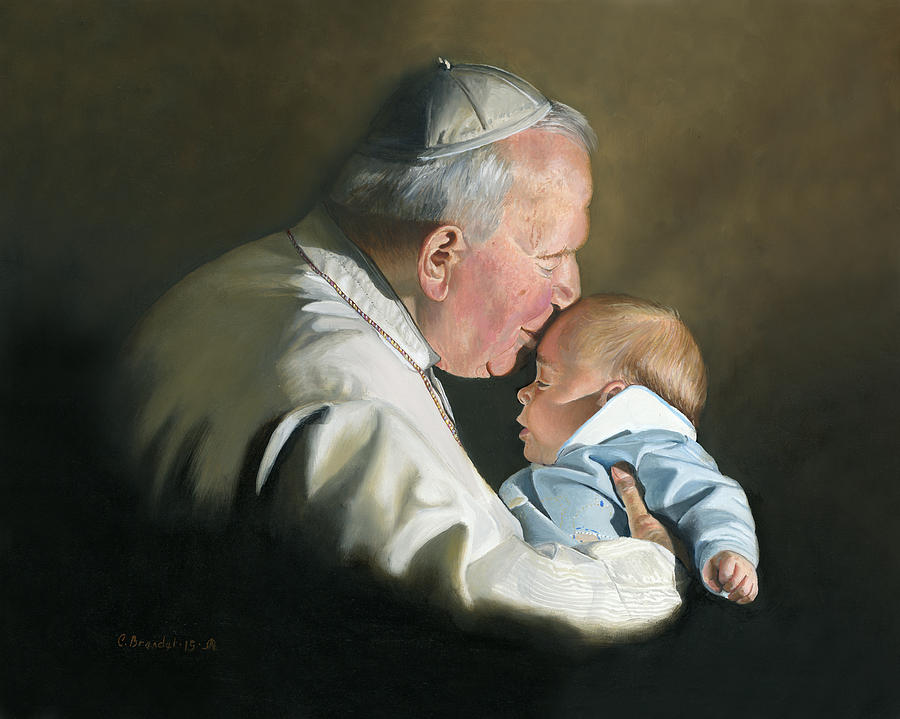I know some pretty amazing priests and Bishops. I know some really awesome dads, too. I see very clearly that the qualities that transform a good priest into a spiritual father, are similar to the qualities that turn good men into great dads.
[bctt tweet=”I have come to see very clearly that the qualities that transform a good priest into a spiritual father, are similar to the qualities that turn good men into great dads.” username=”BrettPowelllorg”]
Esteem the Role. These men feel the weight of responsibility to be a good dad or a good spiritual father, valuing their position of influence in the home, in the parish or Diocese. Not because these men hold it themselves but because the role itself influences the lives of so many people. They do not take themselves too seriously but take very seriously the call of God to become a good dad in the home or a spiritual father to a community.
[bctt tweet=”These men do not take themselves too seriously, but they take very seriously the call of God to become a good dad in the home or a spiritual father to a community. ” username=”BrettPowellorg”]
Learning. Good dads, just like good priests and Bishops, are aware of the gaps between the men they are called to be in their office of leadership and the men they truly are. These men seek to close the gap through formation – character development, skills acquisition, and increasing competency in one area or another. Knowing that, as their inner circle of formation and knowledge increases, so does the outer edge of ignorance and incompetence. These men see learning and growing as a life-long journey. Their passion for learning becomes contagious to those around them, either their children or parishioners.
Initiate. Moms have a relational advantage over dads because moms get nine months of intimate interaction with their baby in the womb during pregnancy. After the baby is born, the mom is able to nurse the child to bring nourishment and comfort. Dads do not have these built-in systems for developing intimacy. Dads must initiate a relationship or the relationship will not flourish. And when they do initiate and pursue their children, great interactions develop and evolve. Good spiritual fathers and great dads both resist temptations toward passivity. They initiate intimacy by drawing near to others, taking the initiative to be vulnerable and creating a safe space in the relationship to engage emotionally. These dads resist a transactional approach to relationships, wanting more for others than they want from others.

Balance Tenderness and Fierceness. Jesus was tender when He cared for lepers, healed the sick, whispered to the little girl, “Talitha Kum,” and forgave the woman caught in adultery. Jesus was fierce when needed as well. “Woe to you, Pharisees, you hypocrites! You snakes! You brood of vipers! How will you escape being condemned to hell?” Way too many people see Jesus as a passivist, a deified Mr Rogers when in actuality, He is more like William Wallace or Maximus Decimus Meridius. Great dads and spiritual fathers rarely get this wrong. In the clergy abuse cases that were mishandled, leaders got it backwards. The leaders were tender with perpetrators when they should have been fierce. And fiercely defending the Church when they should have been tender with victims. Dads that turn a blind eye to major character issues in their kids while blowing up over minor infractions like spilt milk, also get it backwards. As kingdom leaders, we should try not to misplace tenderness and fierceness. The best dads and spiritual shepherds rarely do, that is what makes them great.
[bctt tweet=”The best leaders are tender and fierce. In abuse cases that were mishandled, leaders got it backwards. They were tender with perpetrators and fiercely defended the Church against the victims when they should have been tender. ” username=”BrettPowellorg”]
Live the Eulogy Virtues. When people are asked to identify qualities in the spiritual leaders most admired, people rarely say, “the ability to craft a strategic direction” or “effective decision making.” Rather, people talk about virtues like empathy, honesty, integrity, compassion, and resilience. They say, “I felt inspired and hopeful in their presence.” They share stories of how the leader helped them dream more, do more and become more in all facets of life – not just at work. The same holds true for dads. The kids do not want the dads to just “bring home the bacon.” The kids want emotional investment, engagement in the home and intentionality. The most painful mourning at funerals is to mourn the loss of what one never had. When one mourns what was lost, as opposed to mourning what one has never had, there is a celebratory tone not the finality of something never experienced. The best dads and the best spiritual fathers live each day in such a way to be deeply missed when they are gone.
As a leadership consultant, I have always appreciated the correlation between leadership and fatherhood – be it biological fatherhood or spiritual fatherhood. The qualities I have identified above, transform good men into great dads and great priests into powerful spiritual fathers.

